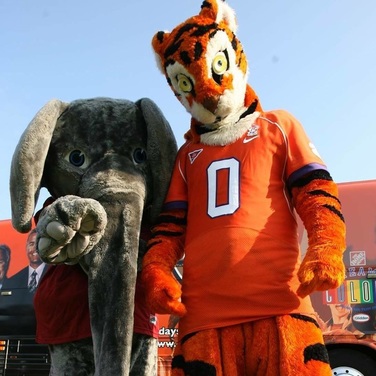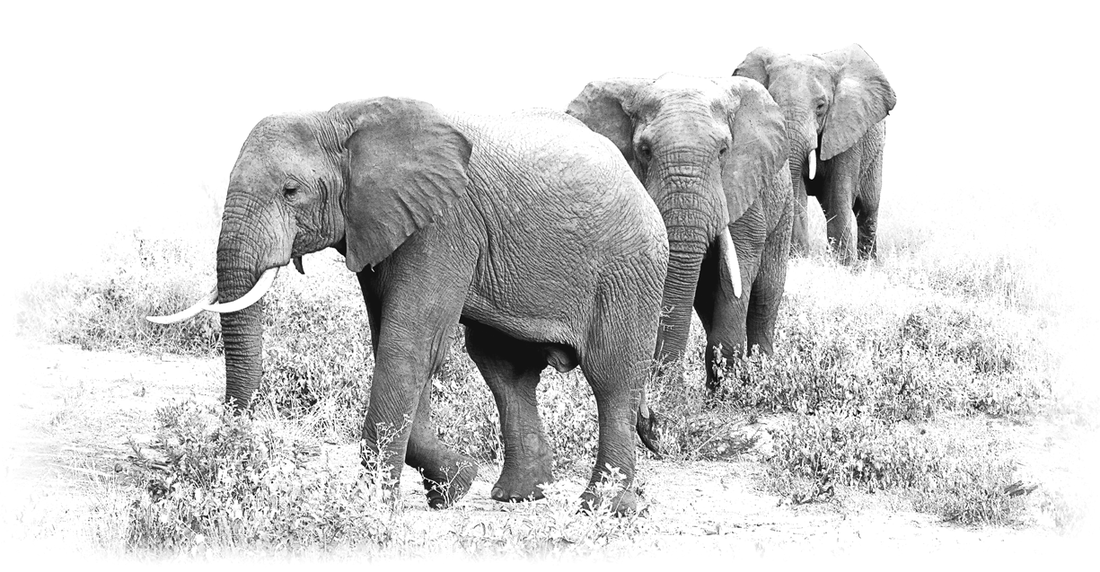 University of Alabama students and fans are gearing up in great anticipation as the Alabama football team prepares to take on Clemson for the College Football National Championship in Glendale, AZ next Monday. This National Championship presents an opportunity to showcase the work that students, faculty, alumni, and fans of both universities are doing to protect their mascots. Both Big Al and The Tiger are hallmarks of the athletic programs at the University of Alabama and Clemson University, respectively. Unfortunately, their wild counterparts are declining across their natural ranges. Habitat loss and a global poaching crisis are driving elephants and tigers toward extinction. However, Tide for Tusks and Tigers for Tigers are working to ensure their mascots continue to thrive in the wild. Although we may be rivals on the field, by channeling the passion of two of the most powerful fan bases in all of college football we can truly make a difference for the future of our wild mascots. During the National Championship Game, Tide For Tusks and the National Tigers For Tigers Coalition are leading a joint social media campaign with the two student-led initiatives from the University of Alabama and Clemson University. With a stadium filled with an estimated 65,000 people, the two organizations will ask thousands of students and fans to show their solidarity for their wild mascots by using the hash-tag #ProtectOurMascots. Our hope is that this effort will become much broader in scope to bring about an exchange of ideas and to develop new avenues for research and conservation. It is only with the conscientious support of the University of Alabama students, faculty, staff and alumni – who deeply believe in protecting a keystone species like the African elephant – that we can become a part of the solution to save a wildlife icon for future generations. You can do something! Care. Share. Give! www.tidefortusks.org
1 Comment
By Reata Strickland
As a child I remember singing a song called “There’s a Hole in the Bottom of the Sea”. You would start out with a hole and then end up with “On the speck on the flea on the tail on the frog on the bump on the log in the hole in the bottom of the sea.” For the past three years I have devoted a great deal of time and energy to researching the African elephant. The issue that attracted my attention to the African elephant was the rate that these magnificent creatures were and are being slaughtered each year. The numbers quoted by reputable sources are between 30,000 and 35,000 each year. Being a graduate of The University of Alabama, where the African elephant is the mascot and a beloved symbol, these numbers are alarming. But there’s so much more to this than just the number of elephants killed a year. The killing of African elephants for ivory is just one step in a long journey. The poached ivory from the massacred elephants are used by militant groups to fund terror and purchase guns. Park rangers and villagers on the African front are caught in the middle of a bloody struggle where life has little to no value. The militant groups sell ivory to illegal smugglers who then ship or fly the ivory to Asia. In Asia, the ivory is made into carvings, keychains, and trinkets. These goods are then sold and shipped around the world. Mainland China is considered to be the world’s largest ivory consumer, however the United States is the world’s second largest ivory consumer. The ivory trade is a bloody trail that ends up on exhibit in someone’s home on a table or bookshelf. The laws governing ivory trade are ambiguous and people do not know what ivory is legal or illegal. Smugglers and terrorists take advantage of this ambiguity and map out a road of destruction, death and terror. There are many things in the hole in the bottom of the sea, and there are many factors to the killing of elephants in Africa. To stop the song and the build up of things in the hole in the bottom of the sea, you stop singing the song. To stop the killing of the elephants, we need to stop the demand for ivory. Stop the demand, that will stop the trade, that will stop the poaching, that will stop the killing of the elephants in Africa. Please do something. Join us in our efforts to raise awareness for the dire situation facing the African elephants and help us promote conservation of this threatened species. Care. Share. Give! www.tidefortusks.org #tidefortusks |
AuthorRandy Mecredy is the cofounder and CEO of Tide for Tusks. Archives
April 2016
Categories |


 RSS Feed
RSS Feed
